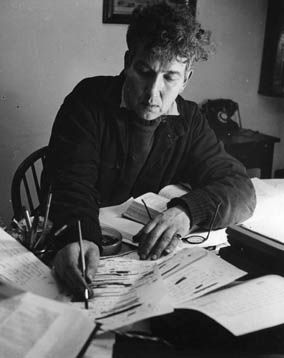July 24, 2006
Happy Birthday, Robert von Ranke Graves!

Born this day in 1895, Graves probably is most popularly known now for his I, Claudius and Claudius the God, thanks to the Masterpiece Theatre dramatization of those novels. Also of note is his Goodbye To All That, the extraordinary autobiography of the first part of his life, including his service in the trenches in World War I, during which he was badly wounded and given up for dead. Literary types will also remember him as one of the most notable poets of WWI, along with his close friend Siegfried Sassoon, although I have to confess I've never read more than a snippet of his poetry.
In fact, I mostly read Graves for his historical fiction, of which he wrote quite a bit. The list of novels (I've bolded the ones I've read) in his bibliography includes:
My Head! My Head! (1925)
The Real David Copperfield (1933)
Claudius the God (1934)
I, Claudius (1934)
Count Belisarius (1938)
Sergeant Lamb of the Ninth (1940)
Proceed, Sergeant Lamb (1941)
The Story of Marie Powell, Wife to Mr. Milton (1943)
The Golden Fleece (1944)
Hercules My Shipmate (1945)
King Jesus (1946)
Seven Days in New Crete (1949)
Watch the North Wind Rise (1949)
Homer's Daughter (1955)
Graves went out of his way to cast the language and flavor of each of these novels in the period of which it speaks. Thus, the substance and style of, say, Wife to Mr. Milton is completely different from that of Hercules, My Shipmate. For the most part, I think he did a very fine job of it.
Graves also wrote a good deal about Classical and pre-Classical civilizations in the Mediterranean; prehistoric, historic and modern religions; and about the art and psychology of writing itself. I made my way through The White Goddess, in which Graves propounds his theories about a pre-classical matriarchal social structure in the Med dominated by worship of the Goddess in her three manifestations as maiden, nymph and mother, and how elements of this structure survived (and survive) in more modern forms. I can't say that I really buy into these notions, but I find them extremely interesting nonetheless.
I just recently finished Watch The North Wind Rise, Graves' crack at futuristic science fiction. What fascinated me about it was how it took elements from virtually every other genre of Graves' work that I've read - historical fiction, religious theory, autobiography - and welded them together.
UPDATE: I've recently joined a very good "Quotation of the Day" email list thanks to my real life pal Bev. Today's quote is about Graves. Here is a section from his war poem "The Last Post":
The bugler sent a call of high romance --Posted by Robert at July 24, 2006 10:09 AM | TrackBack
"Lights out! Lights out!" to the deserted square.
On the thin brazen notes he threw a prayer,
"God, if it's this for me next time in France...
O spare the phantom bugle as I lie
Dead in the gas and smoke and roar of guns,
Dead in a row with the other broken ones
Lying so stiff and still under the sky,
Jolly young Fusiliers too good to die.


 Image courtesy of the lovely and talented
Image courtesy of the lovely and talented 